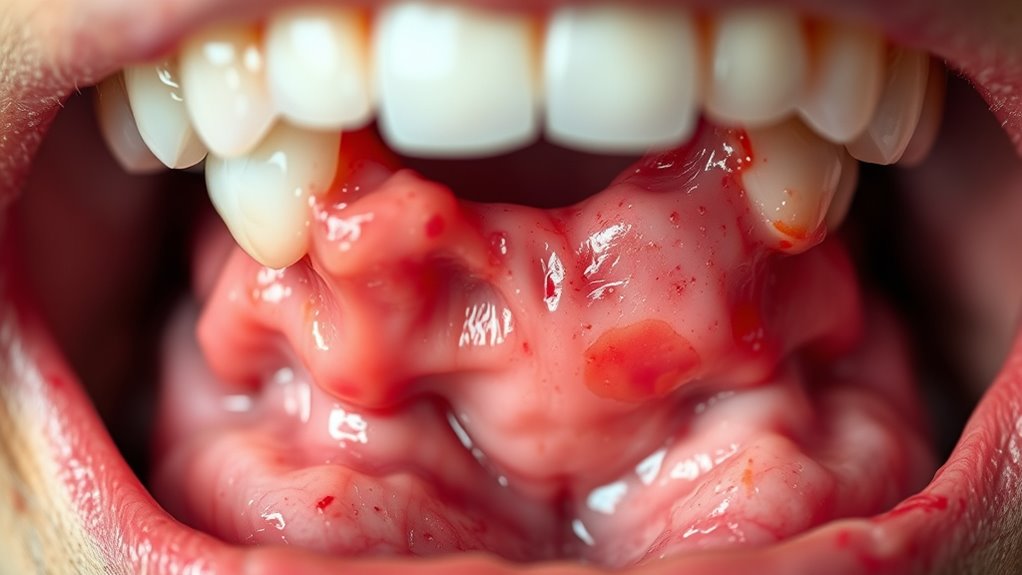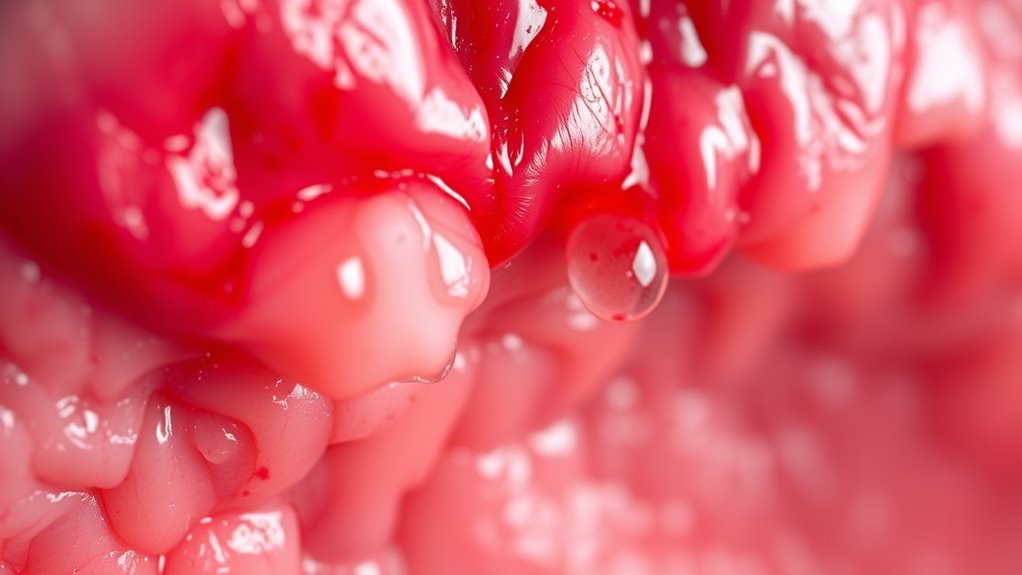Seasonal gum inflammation occurs because environmental changes, hormonal shifts, and immune responses all interact to affect your gum health. Fluctuating humidity, temperature, and allergens can increase your immune system’s reactivity, causing swelling and redness. Hormonal fluctuations during different seasons also weaken gum tissues and boost inflammation. These factors combine to make your gums more sensitive and prone to issues at certain times of the year. If you keep exploring, you’ll discover how to manage these influences effectively.
Key Takeaways
- Seasonal changes in humidity and temperature can trigger immune responses that increase gum inflammation.
- Hormonal fluctuations throughout the year influence blood flow and bacteria balance, exacerbating gum swelling and redness.
- External allergens during specific seasons heighten immune reactivity, leading to increased gum inflammation.
- Variations in immune system regulation due to environmental cues can intensify the body’s inflammatory response in gums.
- Hormone-immune interactions during seasonal shifts amplify tissue sensitivity, increasing the risk of gum bleeding and swelling.

As seasons change, many people notice increased gum inflammation, but understanding why requires exploring the underlying science. Your body’s immune response plays a central role in how your gums react to seasonal shifts. When your immune system detects irritants or bacteria, it triggers inflammation as a defense mechanism. During certain times of the year, your immune response can become more reactive due to environmental factors like humidity, temperature changes, or allergens, which can exacerbate gum swelling and redness. These fluctuations often lead to heightened sensitivity in your gums, making you more prone to discomfort and bleeding. Recognizing this connection helps you understand that seasonal inflammation isn’t solely about oral hygiene but also involves your body’s internal reactions to external cues. Additionally, immune system regulation can influence how your body responds to these seasonal changes, impacting the severity of inflammation. Hormone fluctuations are another critical factor influencing seasonal gum inflammation. Throughout the year, your hormone levels naturally rise and fall, especially in response to environmental changes, stress, and daylight exposure. For example, during spring and fall, shifts in hormone production can weaken your gum tissue’s resilience. Elevated levels of certain hormones, such as estrogen and progesterone, increase blood flow to your gums, causing them to become more sensitive and prone to inflammation. These hormonal changes can also alter the balance of bacteria in your mouth, fostering conditions that promote gum disease. As a result, you might notice increased swelling, tenderness, or bleeding during specific seasons when hormone fluctuations are at their peak. Understanding this interplay helps you see that seasonal gum inflammation isn’t just about oral care but also about your body’s hormonal responses. Moreover, hormone fluctuations can influence your immune response, amplifying the inflammation process. When hormones shift, they can modulate immune activity, making your body more reactive to bacteria and irritants in your mouth. This heightened immune response can lead to more pronounced inflammation and discomfort during certain seasons. For example, a seasonal increase in hormone levels might amplify your body’s reaction to plaque buildup, resulting in more noticeable gum swelling and bleeding. Recognizing these interconnected factors empowers you to take proactive steps in managing seasonal gum inflammation, such as maintaining diligent oral hygiene, managing stress, and seeking dental advice when inflammation seems persistent or severe.
Frequently Asked Questions
Can Seasonal Gum Inflammation Be Completely Prevented?
You can’t completely prevent seasonal gum inflammation, but you can reduce its impact. Be aware of common gingivitis triggers like hormonal changes and seasonal triggers such as weather shifts. Maintain good oral hygiene by brushing and flossing regularly, and visit your dentist for checkups. Managing stress and eating a balanced diet also help keep inflammation at bay. While full prevention isn’t guaranteed, these steps greatly lessen seasonal gum inflammation’s severity.
Are Certain Age Groups More Susceptible to Seasonal Gum Issues?
You might feel like you’re battling a tidal wave of gum discomfort, especially during seasonal changes. Certain age groups, like teens and women experiencing hormonal fluctuations, are more susceptible to seasonal gum issues due to age-related factors. These hormonal shifts can trigger inflammation and make your gums more vulnerable. Stay vigilant with good oral hygiene, and consult your dentist if symptoms worsen, helping you stay ahead of seasonal flare-ups.
Do Specific Foods Worsen Seasonal Gum Inflammation?
Certain foods can worsen seasonal gum inflammation, acting as food triggers that intensify your discomfort. Diet impact is significant, so avoid sugary snacks, acidic beverages, and processed foods during flare-ups. These items can increase inflammation and irritate your gums. Instead, opt for anti-inflammatory foods like fruits, vegetables, and lean proteins. Being mindful of your diet helps manage symptoms and reduces the severity of seasonal gum issues.
How Quickly Does Seasonal Gum Inflammation Typically Resolve?
Seasonal gum inflammation usually resolves within a few days to two weeks, depending on your oral hygiene and overall health. You can promote gum healing by maintaining good brushing and flossing routines, and using anti-inflammatory mouthwashes. If inflammation persists beyond this period, it’s important to consult your dentist, as prolonged inflammation can indicate underlying issues that need professional treatment. Staying consistent with your oral care helps reduce inflammation duration effectively.
Is Seasonal Gum Inflammation Linked to Other Seasonal Health Problems?
Yes, seasonal gum inflammation often links to other seasonal health problems. When your immune response weakens due to hormonal fluctuations, your body’s defenses drop, making you more vulnerable. This domino effect can lead to issues like colds or allergies. So, it’s not just your gums that suffer; seasonal changes can set off a chain reaction, affecting your overall health. Stay vigilant and keep up with good oral hygiene to stay ahead.
Conclusion
Understanding seasonal gum inflammation helps you take better care of your oral health. Did you know that up to 70% of people experience increased gum sensitivity during certain times of the year? By staying vigilant and maintaining good oral hygiene, you can reduce discomfort and protect your gums year-round. So, keep up with regular brushing, flossing, and dental visits—your smile will thank you, no matter the season!









